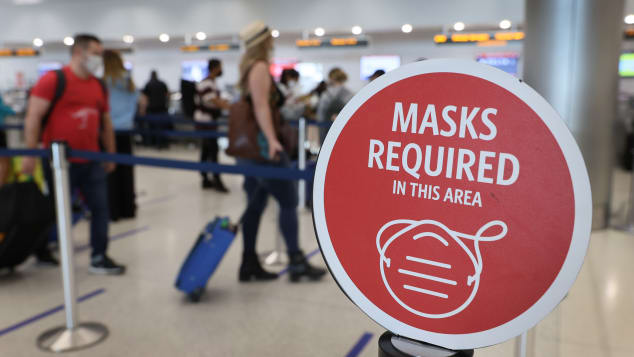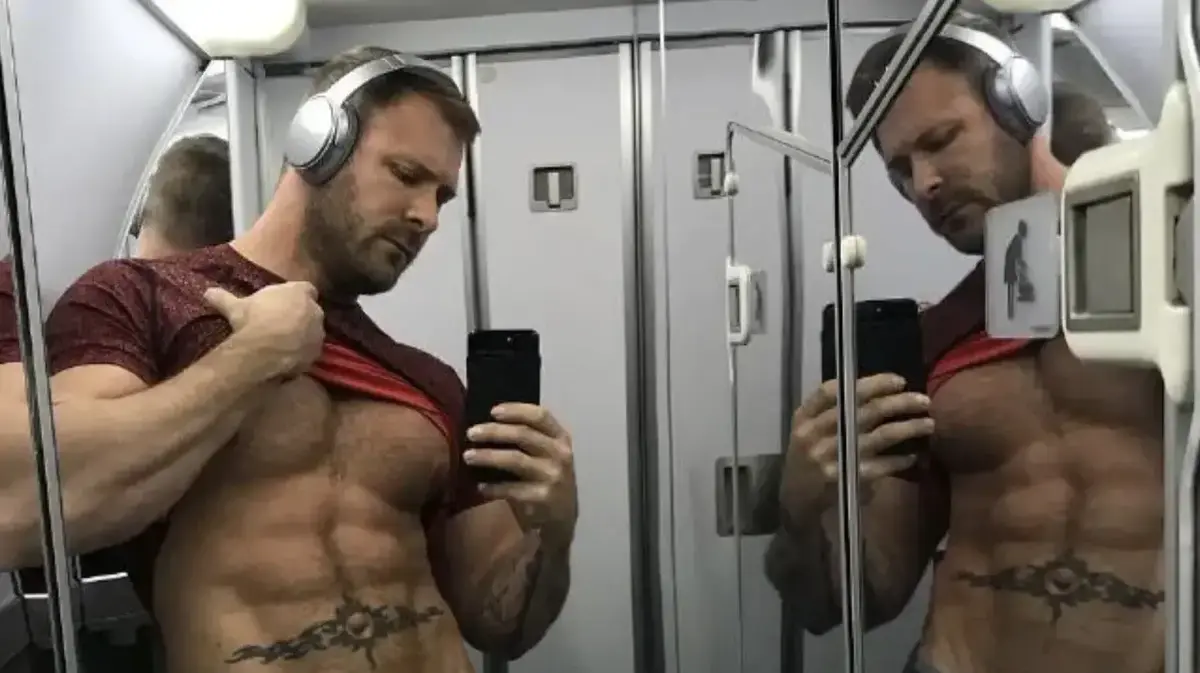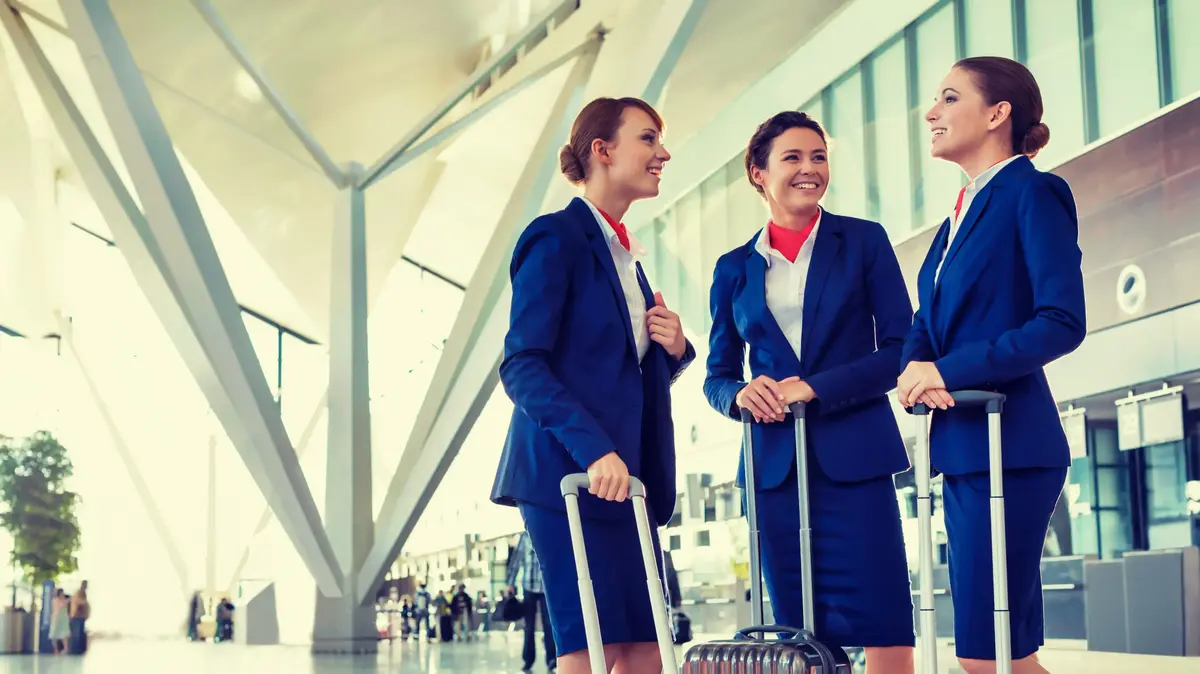Why is flying now so difficult and could it be worse?
0:52
(CNN) -
Your list of preparations for air travel this holiday season surely includes the following: a high-quality, comfortable face mask;
sanitizer;
arrive at the airport in advance;
and easy-to-remove jacket, shoes, laptop, and toiletries for security screening.
However, according to flight attendants, this advance planning may not prepare you for the full reality of flying in 2021, and they are not just talking about covid-19.
"You may have seen conflicting passengers or conflicts on board the airlines in the news this year," said Sara Nelson, international president of the Flight Attendants Association-CWA, which represents some 50,000 flight attendants in 17 airlines.
"There have been more than 5,000 conflicting passenger reports sent to the Federal Aviation Administration since the beginning of this year," Nelson said.
"That means more disruptions in 2021 than in the entire 31-year history of such behavior. And we haven't finished the year yet!"
And some passengers face hefty fines and possibly a lawsuit.
They propose to fine passengers for not wearing masks 1:13
CNN spoke with Sara Nelson about what flight attendants want us to know about problem passengers, and more, before we get on a plane to visit friends and family at parties.
This conversation has been edited slightly for clarity.
advertising
Sara Nelson, international president of the Association of Flight Attendants, works on a trip before the pandemic.
(Courtesy of the Flight Attendants Association-CWA)
CNN:
Data from the Federal Aviation Administration (FAA) shows that more than 70% of incidents on airplanes this year are related to the use of masks.
Why do you think this happens?
Sara Nelson:
First of all, it is very likely that many people are traveling for the first time since the pandemic began.
And they have forgotten, or just don't know, that air travel has a whole set of rules to keep everyone safe.
You have to go through the security check and practically undress to show that you are not a threat.
You can't smoke, for a long time.
Everyone has to wear a seatbelt and position their seats and have the trays on top.
They also have to wear a mask from when they step foot at the airport until they leave the next airport at the end of their journey.
And by the way, that is no longer an airline policy, but a federal requirement since February.
This is the guide with the new travel requirements to the United States that applies from this Monday
Those federal regulations are in place to make sure we maintain a safe space for everyone who travels, because not everyone can get vaccinated yet.
And it is very important that people understand why the rules exist.
That is why I emphasize this so much.
We really won't be safe unless everyone follows the rules and we approach this in the spirit that we are all in this together.
But here's something bigger.
Many people are disgusted by wearing the masks, because many leaders have made it a point of provocation that people are listening to.
I've been a flight attendant for 25 years, and throughout my career, when something happened socially or politically in this country, we saw the ramifications on airplanes.
And this absolutely abounds this year.
A poster regarding the federal mask requirement is seen as travelers prepare to check in at Miami International Airport on February 1, 2021, the day the new rule went into effect.
(Credit: Joe Raedle / Getty Images)
CNN:
What effect do these incidents have on aircraft safety?
Nelson:
It is affecting the ability of flight attendants to do their jobs.
Before 9/11 we were the first to respond to health and safety emergencies on board.
But after 9/11, we also became the last line of defense for air security against terrorism.
These on-board disturbances that have taken place are not only a threat to the crew and the passenger, due to the possibility of people being directly injured in these violent outbursts, but they also distract the flight crew.
They potentially put us in a position to lose track of other threats, or bigger threats, such as a coordinated attack.
This is something that people who want to do us more harm are also looking at, wondering, "Is this a new tactic we can use to create a distraction?"
Now this is not something I want people to think about when they fly out to see their loved ones.
I want to be very clear about it.
It is our job to identify these problems.
But I explain this because I want to make it clear why we take these incidents so seriously.
We do not want anyone to be injured on board.
But there is also a greater threat.
Rebellious passengers put flight safety at risk, FAA warns
CNN:
Are other passengers in danger when these disruptions occur?
Nelson:
Possibly.
They could be exposed to a fight, or get hit by someone who loses control.
There are incidents in which conflict and violence occurs between passengers.
We have had a few cases where individuals have jumped on the cockpit.
And that is a very serious concern.
Certainly the trip can be interrupted.
When someone refuses to wear a mask or buckle up, we will not walk away from the door if they refuse to cooperate.
And if we are flying, and the conflict is severe enough, your flight could be diverted.
So it is undesirable for these things to happen on your plane because there is a risk of getting hurt, and there is a risk of interrupting your trip causing you to lose connections and then family events.
Now, conflicts do not always have to do with masks.
Some of the more recent violent events have nothing to do with it.
Air travel volume is expected to approach pre-pandemic levels during Thanksgiving.
This photo was taken during vacation last year at the Seattle-Tacoma International Airport.
(Credit: David Ryder / Getty Images)
People get annoyed by any kind of safety instruction: "Raise your tray. Could you lift your seat so you are not on the knees of the man behind you?"
Any kind of instruction.
Then the alcohol.
People cannot drink their own alcohol on a flight or even at the airport.
They are not allowed to serve themselves.
And that is new to some people.
People do not like to be told that they cannot drink their alcohol.
And the fact that they've been drinking also contributes to their attitude because they do things they might not do sober.
Some of these things are racially charged.
Gender, race and homophobia insults accompany disruptions in 61% of incidents, according to a survey of flight attendants.
The United States opens for vaccinated international travelers.
This is what you can expect
CNN:
What are the warning signs of an impending altercation, and what do you advise people to do if one occurs on their flight?
Nelson:
You have to watch out for angry behavior, like name calling.
We have had people hit the backs of the seats or hit their own hand.
Any type of violent or threatening behavior and any type of insult is usually a clue.
We recommend that you notify a flight attendant at the first sign of trouble so that we can try to de-escalate the situation.
We are trained in de-escalation, and also in how to lead other people to help.
So unless there is an imminent threat of people getting hurt, we advise passengers not to act on their own because they may unintentionally make the situation worse.
If you are sitting next to the altercation, do not press the distress button, as that could drag you into the situation.
If you can, get up and go to the galley and tell the crew members, or try to fix your gaze on someone a few seats away to get their attention and go talk to the crew or press their call button. .
Look around you and see if there are other helpers, other witnesses.
We encourage people to be a good witness, not to look the other way.
Are you worried about traveling with children not vaccinated against covid-19?
6 questions and answers on how to manage risks
CNN:
What if you are traveling with children?
Nelson:
The best thing would be to try to get away from the situation.
That may be impossible because you are sitting down and there is no way around it.
Move your child to the window or anywhere that is as far away from the action as possible.
Try to cover for your children and ask for help.
But I want to emphasize that these incidents occur with a relatively small group of people.
And people really respond to the tone that is set on board or at the airport, so I can't stress enough how important it is to take a few moments to talk to your family and think about going with an attitude of kindness and patience.
Air incidents with unruly passengers on the rise again, according to FAA data
If you are a good witness and are attentive and seek to be of help, that will create a tone that will help make your experience that much better.
I also want to emphasize that we are not ready to accept this as the new normal.
We continue to work with airlines, airports, and the federal government.
One of the things that has been very, very important is that the Justice Department has started publicly prosecuting these incidents.
And as soon as people see that there are serious consequences, we hope that will help people to understand that there are inappropriate ways to act in an airport or on an airplane.
flight attendant interview











